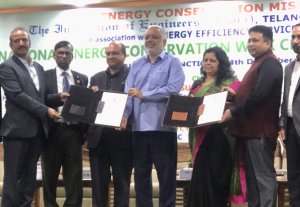New Delhi, In an effort to propagate the importance of energy conservation, Energy Efficiency Services Limited (EESL), a JV of Public Sector Undertakings under the Ministry of Power signed a Memorandum of Understanding (MoU) with Energy Conservation Mission of The Institution of Engineers (India). EESL and Energy Conservation Mission have partnered with the aim to conduct awareness sessions on ‘Energy Conservation’ across 30 schools in the state of Telangana.
They will also collaborate on developing and conducting skill development and training activities for upskilling unemployed youth. Furthermore, they will facilitate capacity building sessions in educational institutions, MSMEs engaged in energy related businesses, NGOs, Women’s self-help groups etc., on energy conservation practices as well as energy efficiency technologies and programmes.
Chief Guest Shri Sunil Sharma (IAS) , Special Chief Secretary Energy Department, Govt of Telangana said ” We have to conserve energy in all its forms and suggested energy saving tips like turn off switch when not in use, use star rated appliances & switch over to Electric Vehicle.” He also emphasized that,” 1 unit saved is 1 unit generated which requires lots of effort and resources.”
Ms. Savitri Singh, GM (Tech) EESL said, “Energy conservation is one of the most cost-effective solutions to energy shortages, as well as a more environmentally friendly alternative to increased energy production. Through this collaboration with Energy Conservation Mission, we hope to accomplish energy savings in Telangana & accelerate India’s path towards a sustainable future.”
In Telangana, EESL has installed over 15.53 Lakh LED streetlights as part of its Street Lighting National Programme. As part of the programme, inefficient lights have been replaced with energy efficient LED lights which offer better visibility and reduce GHG emissions. This has further improved the safety of citizens, particularly, women & children. Additionally, these awareness sessions on energy conservation will aid in the substitution of renewable energy for non-renewable resources, thus helping India achieve its clean energy targets.










